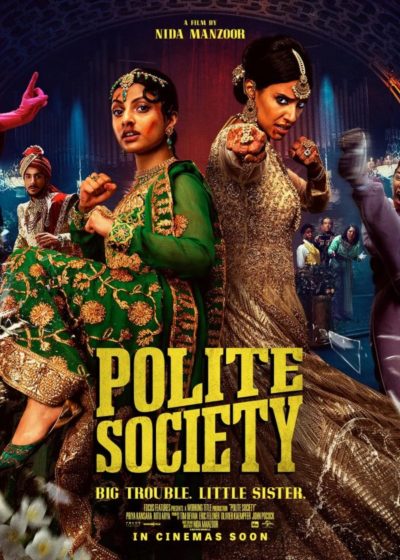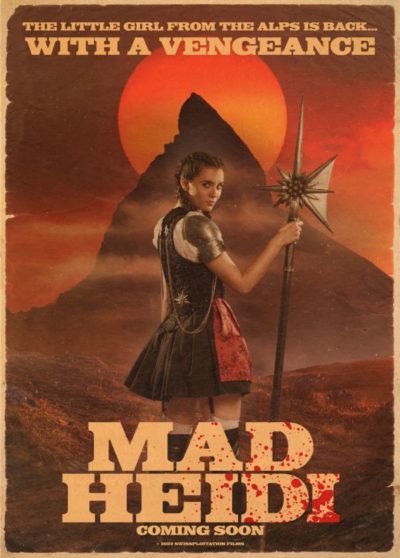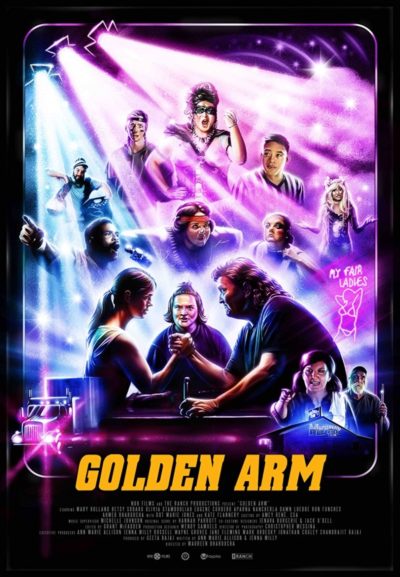★★½
“The bigger they come…”
 The first Giantess Attack! movie was an unexpected guilty pleasure: while obviously low budget, it had no pretensions and an undeniably goofy charm that, at least for me, helped paper over the cracks and microscopic resources. The end of it teased this very movie, and most of the main players have delivered on that promise. Can lightning strike twice? The answer is… not quite. Even at a crisp 67 minutes, it still feels like there is a lot of padding, with recycled footage and elements that go on, after their amusement value has expired. That said, it ends in another impressive giant battle, and still contains some genuinely amusing moments.
The first Giantess Attack! movie was an unexpected guilty pleasure: while obviously low budget, it had no pretensions and an undeniably goofy charm that, at least for me, helped paper over the cracks and microscopic resources. The end of it teased this very movie, and most of the main players have delivered on that promise. Can lightning strike twice? The answer is… not quite. Even at a crisp 67 minutes, it still feels like there is a lot of padding, with recycled footage and elements that go on, after their amusement value has expired. That said, it ends in another impressive giant battle, and still contains some genuinely amusing moments.
Frida (Riley) and Diedre (Tacosa) have split after the events of the first film: the latter has vowed never to become a giantess ever again, and has retreated to her “Fortress of Immeasurable Guilt” to build popiscle-stick models. Frida pays her a visit, and they end up in what can only be described as a cat-fight version of the famous brawl from They Live, over Diedre’s refusal to put on glasses. However, the main threat is the surviving Metaluna twin (Nguyen) from the first movie, who is plotting revenge on Earth. To that end, she kidnaps a scientist, miniaturizes him and forces him to make the mecha-fembot of the title, which goes on the rampage through LA. The only hope is our two heroines, though before they can save the city, the duo first need to reconcile.
There can’t be many movies which open with a Katey Sagal impersonator, but here’s one. It follows with a brutal parody of those cloying, guilt-ridden Sarah McLachlan ASPCA commercials, which is spot on, and resurfaces as a bit of a running joke thereafter. Then, however… the film kinda loses its direction and energy for much of the first half. The sequence where the scientist ends up in Metaluna’s lair, for example, is excruciatingly over-stretched. The same goes for Frida’s ascent up to Diedre’s fortress, where the sole element of humour is that she goes mountain-climbing in go-go boots. Some sequences definitely feel more aimed at the fetish crowd, of whom I am not one.
Once the robot is built – I confess, I did laugh at the supposed method of activation – and unleashed, things become a lot more fun. For we get what we came for, which is cheesy, OTT and completely ridiculous F-sized action. It’s a mix of model work, CGI and green-screen, all done with more enthusiasm than actual resources, yet remains the kind of film-making for which I have an odd affection. Much of Los Angeles is, indeed, destroyed, and our heroines are sentenced to 9,000 hours of community service as a result. Naturally, a third entry is teased, accompanied by the outrageously English accent of the eye-patch wearing “Nicky Fury”. Even if this sequel was a little weaker, I still cannot stop myself from looking forward to: Giantess Attack… In Space!
Dir: Jeff Leroy
Star: Tasha Tacosa, Rachel Riley, Christine Nguyen, Vlada Fox





 I went into this braced for it to be terrible, having sat through the same film-makers’, largely irredeemable
I went into this braced for it to be terrible, having sat through the same film-makers’, largely irredeemable  Sitting somewhere between
Sitting somewhere between  This is another example of someone simply trying to do too much on their movie. For Linch not only starred in, produced and directed this, she also edited it, did the sound design and was the colourist. It’s not hard to predict her talents are not equally divided. It’s a shame, since I really wanted to enjoy this: much like its heroine, there’s a plucky, can-do attitude present, which can only be admired. Unfortunately, anyone above the age of eight is going to be quite hard-pushed to overlook the flaws. While the action is not especially one of those, the volume there is underwhelming, and the romantic, comedic and dramatic elements are hugely variable, to put it politely.
This is another example of someone simply trying to do too much on their movie. For Linch not only starred in, produced and directed this, she also edited it, did the sound design and was the colourist. It’s not hard to predict her talents are not equally divided. It’s a shame, since I really wanted to enjoy this: much like its heroine, there’s a plucky, can-do attitude present, which can only be admired. Unfortunately, anyone above the age of eight is going to be quite hard-pushed to overlook the flaws. While the action is not especially one of those, the volume there is underwhelming, and the romantic, comedic and dramatic elements are hugely variable, to put it politely. Daphne Wool (Varela) has finally had enough of her abusive husband, so has killed him, chopping up the corpse and keeping it in a storage locker. Which actually is a good thing, because it turns out he was wanted by the Mob, and there was a price on his head. For their “help” in carrying out the hit, Daphne and pal Tony Steele (Cappello) are rewarded, but things go further. Daphne becomes a full-time assassin for the gangsters, learning to kill with everything from a paper-clip up, while Tony acts as her facilitator. However, they quickly become a liability to the organization, and are given a “poison pill” contract, being sent to kill weapons inventor Vincent McCabe.
Daphne Wool (Varela) has finally had enough of her abusive husband, so has killed him, chopping up the corpse and keeping it in a storage locker. Which actually is a good thing, because it turns out he was wanted by the Mob, and there was a price on his head. For their “help” in carrying out the hit, Daphne and pal Tony Steele (Cappello) are rewarded, but things go further. Daphne becomes a full-time assassin for the gangsters, learning to kill with everything from a paper-clip up, while Tony acts as her facilitator. However, they quickly become a liability to the organization, and are given a “poison pill” contract, being sent to kill weapons inventor Vincent McCabe. I think it’s safe to say you’ll probably be able to decide within a few minutes, whether or not this is your cup of tea. The opening scene is set in a strip-club where the next act on the main stage is dressed as a nun. After a couple of minutes, she pulls out an unfeasibly large weapon from under her clerical garb, and guns down the mobsters present, in gory fashion. Thereafter, you can expect more of the same, along with extremely savage jabs at organized religion. Catholicism is the main target, but Judaism and Hinduism get their share of jabs: for example, Gandhi is a martial arts teacher. Or there’s a Yiddish hitman, Viper Goldstein (Lavallee), who practices the art of “Jew Jitsu”. If you just roll your eyes at that, this is likely not for you. However, if you roll your eyes and also laugh, then you, like me, may be the intended target audience.
I think it’s safe to say you’ll probably be able to decide within a few minutes, whether or not this is your cup of tea. The opening scene is set in a strip-club where the next act on the main stage is dressed as a nun. After a couple of minutes, she pulls out an unfeasibly large weapon from under her clerical garb, and guns down the mobsters present, in gory fashion. Thereafter, you can expect more of the same, along with extremely savage jabs at organized religion. Catholicism is the main target, but Judaism and Hinduism get their share of jabs: for example, Gandhi is a martial arts teacher. Or there’s a Yiddish hitman, Viper Goldstein (Lavallee), who practices the art of “Jew Jitsu”. If you just roll your eyes at that, this is likely not for you. However, if you roll your eyes and also laugh, then you, like me, may be the intended target audience. Not to be confused with the 2022 rape-revenge film of the same name (which I’ll get round to reviewing down the pipe), this is somewhat lighter in tone, though there’s a case to be made that this clashes terribly with the subject matter. Jenny (Hsu) is a journalist, working under Cheryl (Garofalo),and her work has brought her to the attention of an online stalker, who sends her increasingly disturbed and disturbing emails. When the harassment begins to move from the cyberworld into the real one, and the authorities fail even to reach the level of disinterest, Jenny teams up with room-mate Lisa (Morales), to hunt down the perpetrator and bring him to justice themselves.
Not to be confused with the 2022 rape-revenge film of the same name (which I’ll get round to reviewing down the pipe), this is somewhat lighter in tone, though there’s a case to be made that this clashes terribly with the subject matter. Jenny (Hsu) is a journalist, working under Cheryl (Garofalo),and her work has brought her to the attention of an online stalker, who sends her increasingly disturbed and disturbing emails. When the harassment begins to move from the cyberworld into the real one, and the authorities fail even to reach the level of disinterest, Jenny teams up with room-mate Lisa (Morales), to hunt down the perpetrator and bring him to justice themselves. I’d been aware of this movie for some time, through its innovative crowd-funding approach, which raised $3 million to cover the cost of production. After COVID hit, there were doubts it’d ever see the light of day, but here it is: the first “Swissploitation” film [If not quite the case, it’s certainly the first one with a seven-figure budget, as well as the first Swiss movie covered on this site] And it’s not bad: if you’re familiar with similarly crowd-funded spoof, Iron Sky, this is along similar lines of broad parody. It covers almost every genre of cult from kung-fu films through Starship Troopers to women-in-prison films, e.g. there’s an Asian prisoner
I’d been aware of this movie for some time, through its innovative crowd-funding approach, which raised $3 million to cover the cost of production. After COVID hit, there were doubts it’d ever see the light of day, but here it is: the first “Swissploitation” film [If not quite the case, it’s certainly the first one with a seven-figure budget, as well as the first Swiss movie covered on this site] And it’s not bad: if you’re familiar with similarly crowd-funded spoof, Iron Sky, this is along similar lines of broad parody. It covers almost every genre of cult from kung-fu films through Starship Troopers to women-in-prison films, e.g. there’s an Asian prisoner  Lou Farnt (Brayben) is stuck in her life, with a dead-end job, no apparent friends to speak of, and still living with her domineering mother (Ball). She seeks escape from one self-help guru after another, spending her money on their books, DVDs and audio-tapes, though with little or no apparent positive results. Then, she meets the unconventional Val Stone (Roe), who lives in a seaside caravan and promises to change Lou’s life forever. After some qualms, she agrees to depart with Lou, who does indeed deliver on her promise. For, as the title suggests, Val is a psychotic if smart killer, who is specifically targetting those same gurus. Either she regards them as a curse on humanity with their vapid schemes, or she simply wants to dispose of the competition.
Lou Farnt (Brayben) is stuck in her life, with a dead-end job, no apparent friends to speak of, and still living with her domineering mother (Ball). She seeks escape from one self-help guru after another, spending her money on their books, DVDs and audio-tapes, though with little or no apparent positive results. Then, she meets the unconventional Val Stone (Roe), who lives in a seaside caravan and promises to change Lou’s life forever. After some qualms, she agrees to depart with Lou, who does indeed deliver on her promise. For, as the title suggests, Val is a psychotic if smart killer, who is specifically targetting those same gurus. Either she regards them as a curse on humanity with their vapid schemes, or she simply wants to dispose of the competition. The sport of arm-wrestling has been featured in the movies before, most notably the Sylvester Stallone vehicle, Over the Top. But that wasn’t a comedy – at least, not intentionally. This entry, as well as switching to the distaff side, also has its tongue in cheek, while still sporting a strong message about female empowerment, that never becomes a lecture. If you’re looking for an inspiration I’d saw the
The sport of arm-wrestling has been featured in the movies before, most notably the Sylvester Stallone vehicle, Over the Top. But that wasn’t a comedy – at least, not intentionally. This entry, as well as switching to the distaff side, also has its tongue in cheek, while still sporting a strong message about female empowerment, that never becomes a lecture. If you’re looking for an inspiration I’d saw the